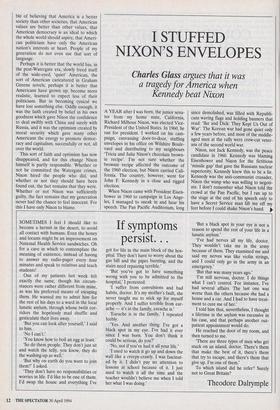If symptoms persist. . .
SOMETIMES I feel I should like to become a hermit in the desert, to avoid all contact with humans. Even the honey and locusts might be an improvement on National Health Service sandwiches. Oh for a cave in which to contemplate the meaning of existence, instead of having to answer my radio-pager every four minutes and speak to relatives and teach students!
One of my patients last week felt exactly the same, though his circum- stances were rather different from mine, as was his preferred means of escaping them. He wanted me to admit him for the rest of his days to a ward in the local lunatic asylum, through whose twilit cor- ridors the hopelessly mad shuffle and gesticulate their lives away.
'But you can look after yourself,' I said to him.
'No I can't.'
'You know how to boil an egg at least.'
'So do them people. They don't just sit and watch the telly, you know, they do the washing-up as well.'
'But why on earth do you want to join them?' I asked.
'They don't have no responsibilities or worries in life. I'd like to be one of them. I'd swap the house and everything I've got for life in the main block of the hos- pital. They don't have to worry about the gas bill and the pipes bursting, and the stairs need repairing terrible.'
'But you've got to have something wrong with you to be admitted to the hospital,' I protested.
'I suffer from convulsions and bad habits, doctor. It's my mother's fault, she never taught me to stick up for myself properly. And I suffer terrible from ear- ache — it's in the family, earache is.'
'Earache is in the family,' I repeated feebly.
'Yes. And another thing: I've got a black spot in my eye. I've had it ever since I was born. You don't think it could be serious, do you?'
'No, not if you've had it all your life.'
'I used to watch it go up and down the wall like a creepy-crawly. I was fascinat- ed by it. I didn't pay no attention to lessons at school because of it. I just used to watch' it all the time and the teacher wouldn't believe me when I told her what I was doing.' 'But a black spot in your eye is not a reason to spend the rest of your life in a lunatic asylum.'
'I've had nerves all my life, doctor. They wouldn't take me in the army because of them. They examined me and said my nerves was like violin strings, and I could only go in the army in an emergency.'
'But that was many years ago.'
'I'm still nervous, doctor. I do things what I can't control. For instance, I've had several affairs. The last one was worse than the others because she had a house and a car. And I had to have treat- ment to cure me of her.'
I told him that, nevertheless, I thought a lifetime in the asylum was excessive in his case, and that perhaps another out- patient appointment would do.
He reached the door of my room, and then turned to me.
'There are three types of men who get stuck on an island, doctor. There's them that make the best of it, there's them that try to escape, and there's them that give up. I'm one of them.'
To which island did he refer? Surely not to Great Britain?
Theodore Dalrymple


























































 Previous page
Previous page